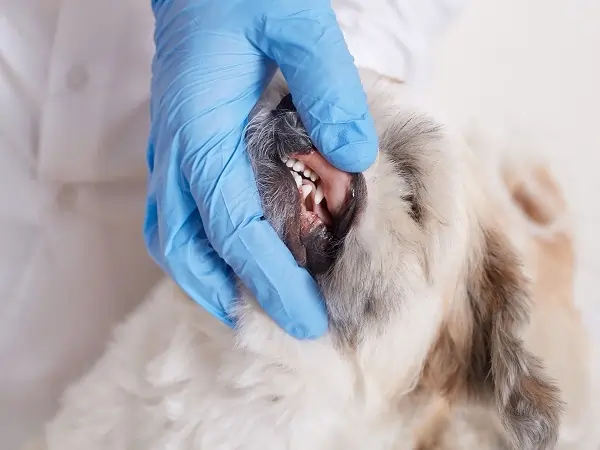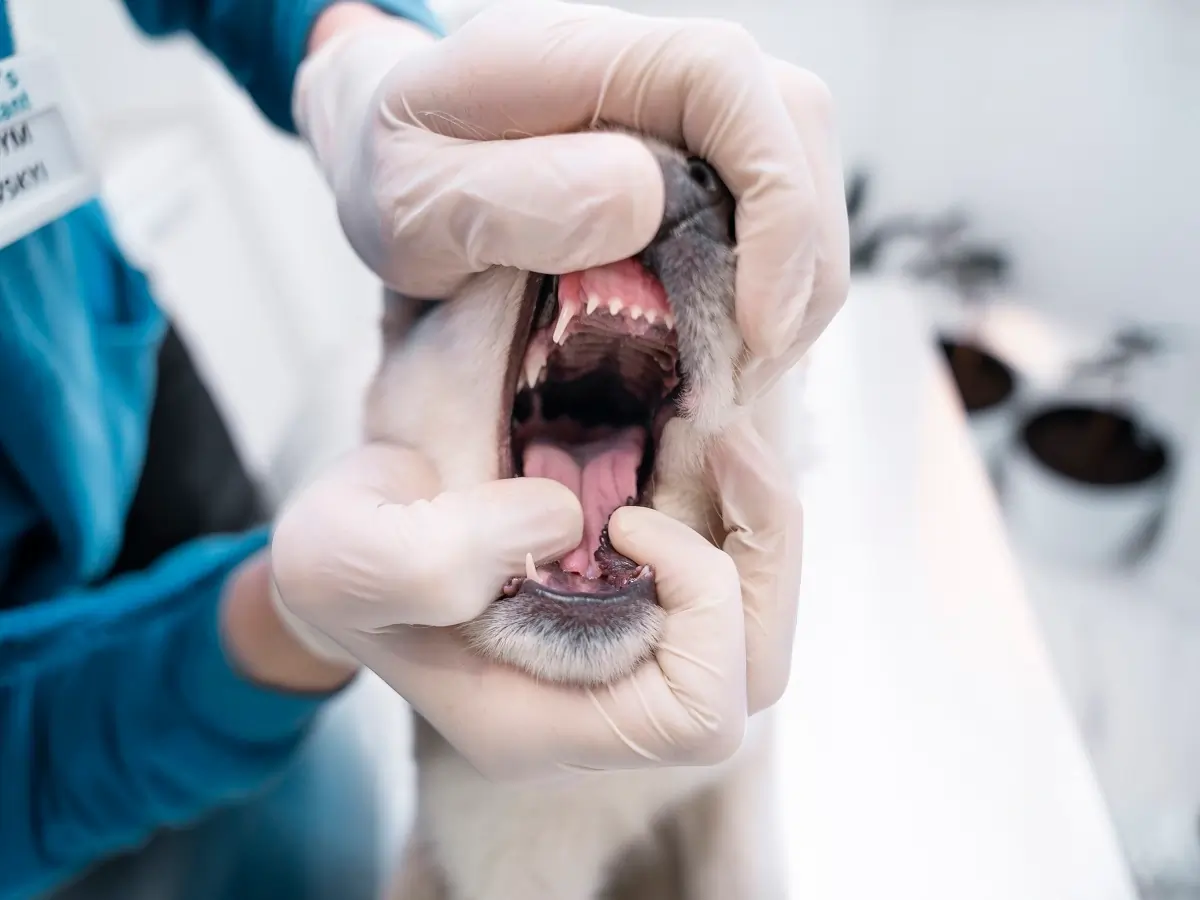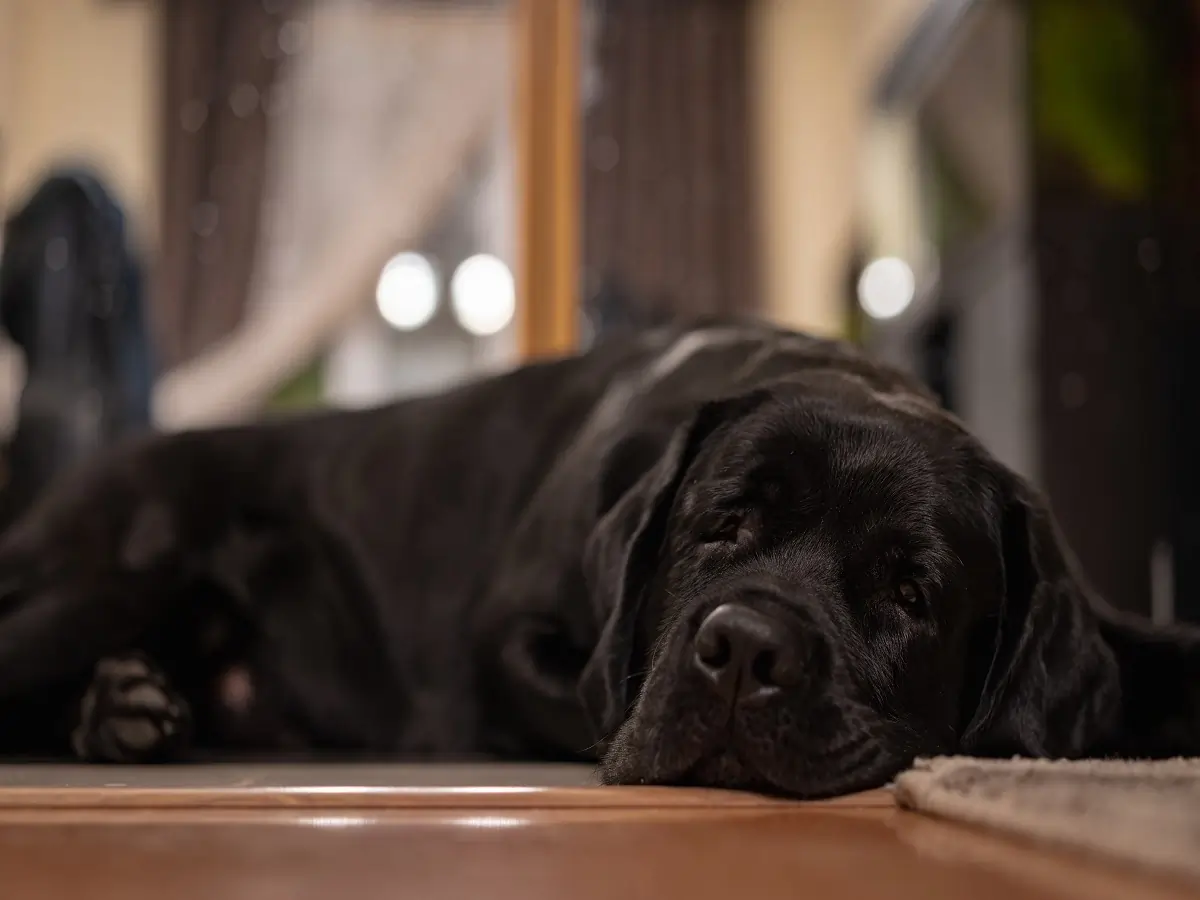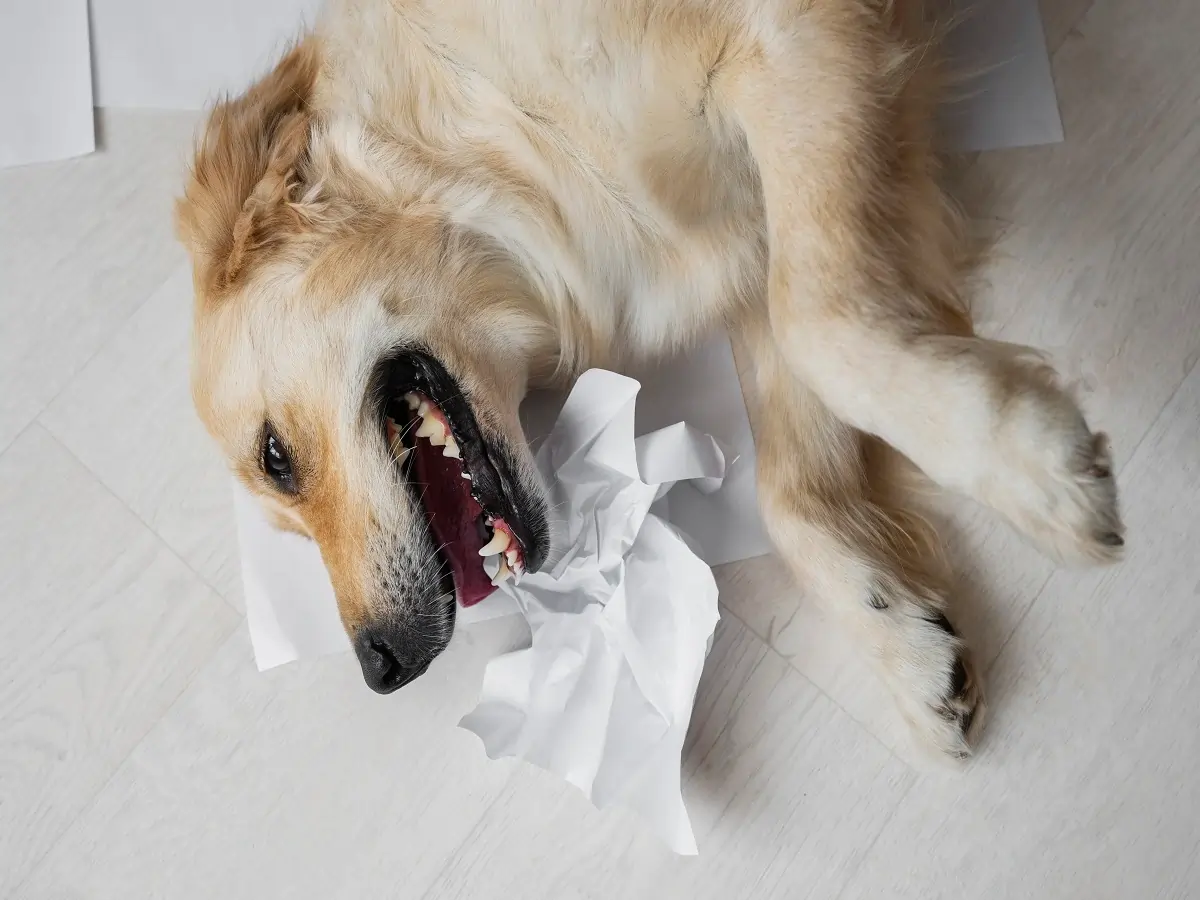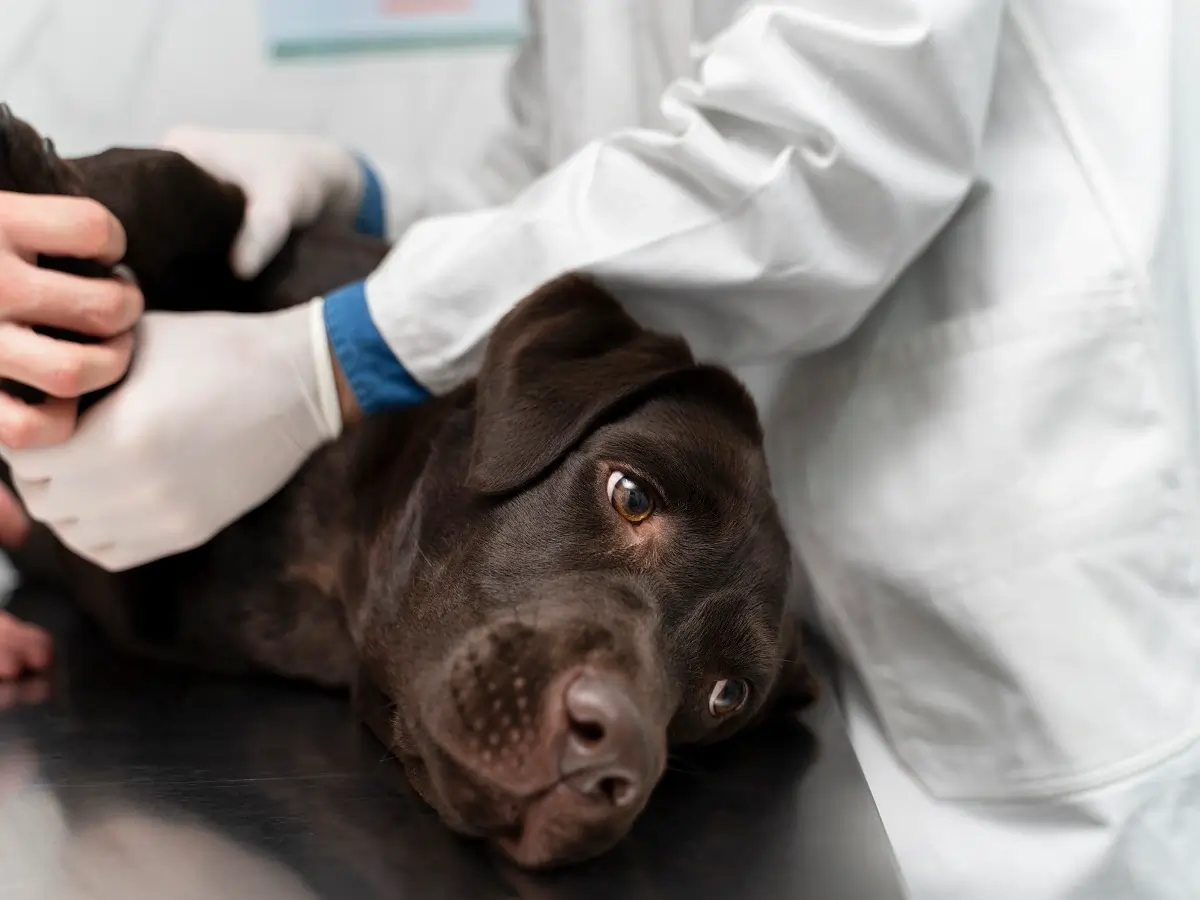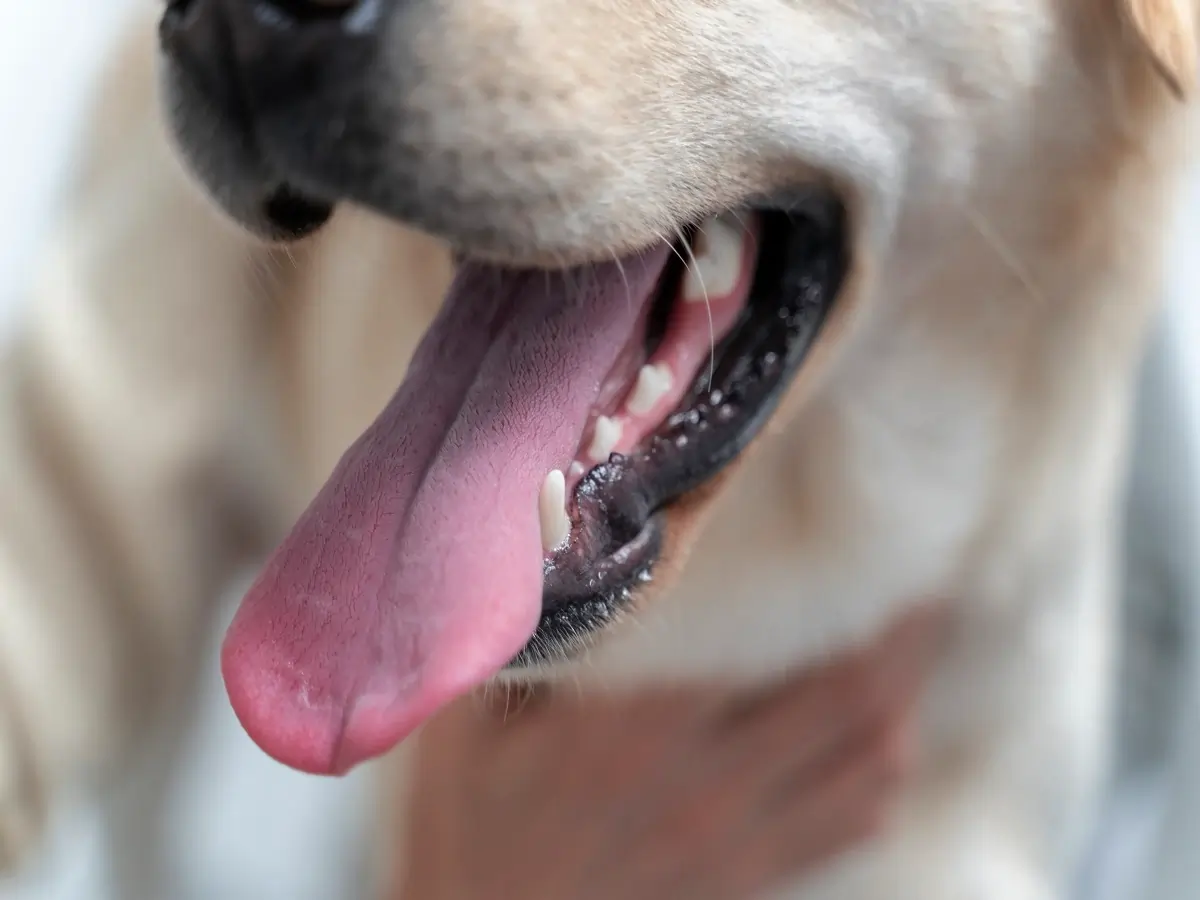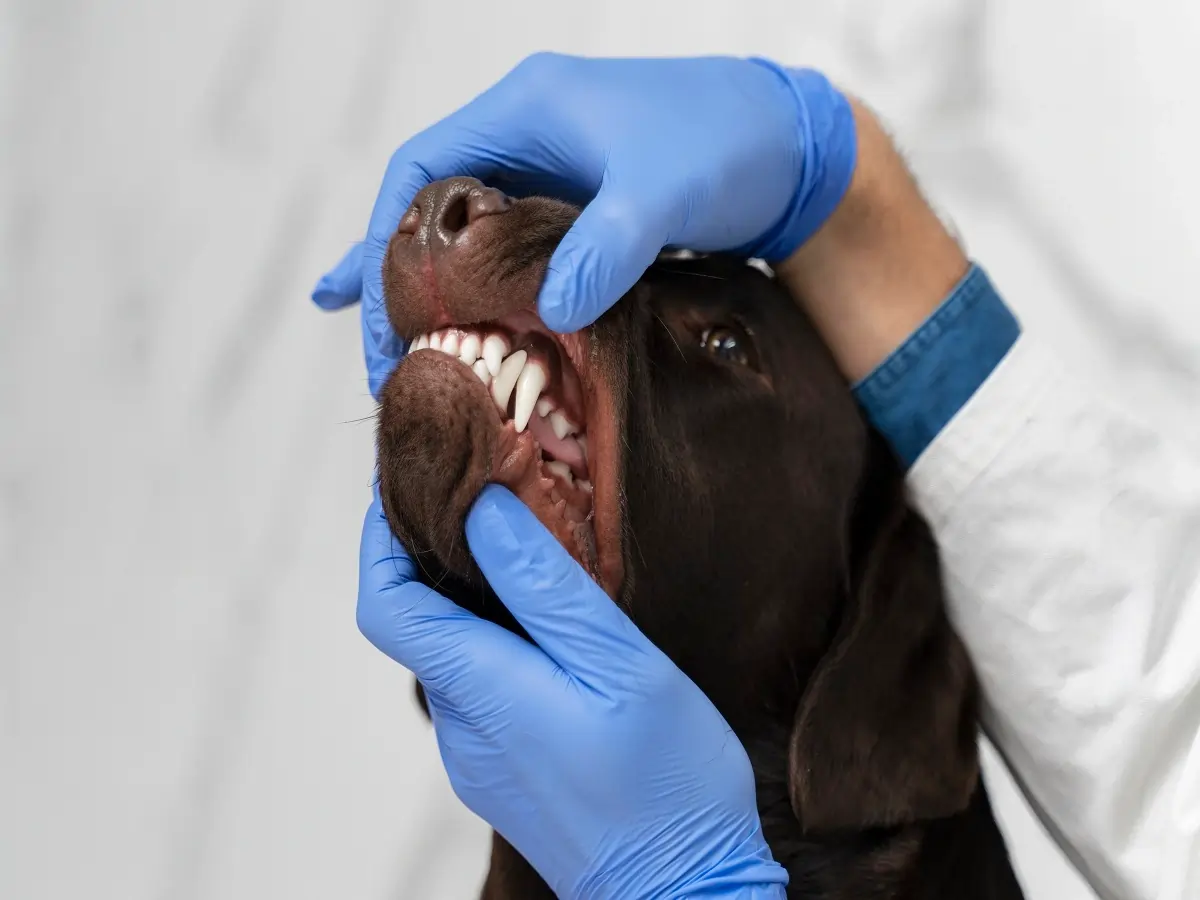Have you ever noticed your dog doing a weird action like grinding their teeth? It might seem strange, but it is important to understand “Why Do Dogs Grind Their Teeth.”
In this article, we are going to talk about why dogs grind their teeth. It can happen for different reasons, like dental problems or feeling stressed out. We will explain all of that and give you some tips to keep your dog’s teeth healthy and happy. So, get ready to learn more about this interesting behaviour with your furry friend by your side.
Table of Contents
ToggleWhat is Teeth Grinding in Dogs?
Teeth grinding in dogs, also known as bruxism, refers to the involuntary and repetitive rubbing or clenching of the teeth. It is when they rub or clench their teeth without meaning to. Sometimes you can hear it, like a grinding sound, or see their jaw moving. If a dog does it now and then, it is usually okay. But if they do it a lot, it might mean something is wrong.
It is important to know the difference between normal chewing, like when they chew on toys, and bruxism, which is more like grinding their teeth for no reason. Knowing this helps dog owners notice if their pet is in pain and needs help.
5 Causes of Teeth Grinding in Dogs
Teeth grinding in dogs can have various underlying causes, ranging from dental problems to emotional distress. Here are some common reasons why dogs may grind their teeth.
1. Dental Issues
Dogs can have problems with their teeth, like gum disease, cavities, and crooked teeth. These problems can make their mouths hurt, so they might grind their teeth. Gum disease happens when the gums get swollen and infected. It can make the gums pull back and the teeth get rotten, causing pain. Cavities form when there is a lot of yucky stuff on the teeth that wears them down and exposes the sensitive parts inside. Crooked teeth can rub against each other and cause pain too.
Sometimes, if a dog gets hurt in the mouth or has sores. They might grind their teeth without even thinking about it. It is important to take dogs to the vet regularly to check their teeth and fix any problems early on. So, they stay happy and healthy.
2. Stress or Anxiety
Dogs can show stress or anxiety in different ways, and one way is by grinding their teeth. Here’s how stress or anxiety can cause teeth grinding in dogs.
When dogs feel stressed or anxious, it can make them grind their teeth. This might happen because of changes in their surroundings, loud noises, being away from their owners, or being in new places. Just like how people clench their jaws or grind their teeth when they are tense. Dogs might grind their teeth as a way to deal with their emotional discomfort. Grinding their teeth can give them something to focus on, even though it does not fix what is causing them to feel stressed.
Also, if a dog is stressed for a long time, it can make the muscles in their body tense, including the ones in their jaw. This tension can make teeth grinding a habit for them, even if the thing that made them stressed is not there anymore. Dogs might also start grinding their teeth as a way to comfort themselves when they are stressed for a long time or really intensely.
It is important for dog owners to pay attention to their dog’s behaviour and notice signs of stress or anxiety, like heavy breathing, walking back and forth, shaking, or making a lot of noise, along with teeth grinding. Finding out what is making the dog stressed and helping them feel better can stop them from needing to grind their teeth. Talking to a vet or someone who knows about animal behaviour can give good advice on how to help dogs feel less stressed and more relaxed.
3. Pain or Discomfort
Dogs can feel pain for different reasons, and one way they might respond is by grinding their teeth. Here’s how pain can lead to teeth grinding in dogs:
First, pain in the mouth can make dogs grind their teeth. Things like tooth decay, gum disease, broken teeth, or mouth injuries can all make a dog’s mouth hurt a lot. When a dog’s teeth or gums hurt, they might grind their teeth to try to feel better or get rid of what is bothering them. Grinding their teeth might make them feel better for a little while, even though it does not fix what is causing the pain.
Also, pain in other parts of the body can make dogs grind their teeth too. Dogs might grind their teeth if they have problems with their muscles and bones, like arthritis, which can make their joints hurt and feel stiff. Dogs with stomach issues, bladder problems, or ear infections might also grind their teeth because they feel uncomfortable.
It is really important for dog owners to pay attention if their dog seems like they are in pain, like if they act differently, don’t want to eat, seem tired, or make a lot of noise. If a dog is grinding their teeth because they are in pain. It is important to take them to the vet as soon as possible. The vet can figure out what is causing the pain and help the dog feel better, maybe with medicine or an operation. By making the pain go away, pet owners can help their dogs feel better and stop grinding their teeth.
4. Medical conditions
Dogs may grind their teeth due to health problems. Here’s how different issues can cause this:
- Malocclusion: Malocclusion in dogs means their teeth don’t line up properly when their mouth is shut. This can happen in different ways, like when the top teeth cover the bottom ones (overbite), or when the bottom teeth stick out more than the top ones (underbite), or other types of crooked teeth. It could lead a dog to teeth grinding.
- Neurological Disorders: Some brain issues can make dogs lose control of their jaw muscles. During or after seizures, muscles can contract involuntarily, making the dog grind its teeth.
- Gastrointestinal Issues: Dogs with tummy problems like ulcers or upset stomachs may grind their teeth because of the pain or discomfort in their gut.
- Temporomandibular Joint (TMJ) Dysfunction: If the jaw joint does not work right, it can cause pain and limit movement. Dogs with this issue might grind their teeth to ease the pain or find a comfy jaw position.
- Chronic Pain Conditions: Dogs with ongoing pain, like arthritis, may grind their teeth as a way to deal with the discomfort all over their body, including their jaws.
Pet owners should watch for changes in their dog’s behaviour, like teeth grinding, and talk to a vet if they think something is wrong. The vet might need to do tests to find out why the dog is grinding its teeth and then make a plan to help the dog feel better. Treating the health problem can stop the teeth grinding and make the dog’s life better.
5. Compulsive Behaviour
Compulsive behaviour in dogs refers to repetitive actions or rituals that a dog performs over and over without a clear reason. These actions might seem pointless and could be a way for the dog to handle stress, anxiety, or boredom.
Sometimes, dogs might grind their teeth because of compulsive behaviour, but it is not very common. Dogs can develop compulsive habits because of things like genes, their environment, or things they have learned. They might do things over and over again to deal with stress, anxiety, or boredom. These habits can include licking too much, chasing their tail, pacing, or doing repetitive things like chasing shadows or lights.
Teeth grinding could be one of these habits, especially if a dog is often anxious or stressed. Like other habits, it might help the dog feel better or distract them. Even if the thing that made them stressed is not around anymore, they might still grind their teeth out of habit.
Compulsive behaviours in dogs can change or get worse over time. What starts as one kind of habit might turn into something else, like teeth grinding. While it is not very common for dogs to grind their teeth because of compulsive behaviour. Pet owners should keep an eye on their dog’s behaviour and ask for help if needed.
Helping dogs with compulsive behaviour usually means trying different things, like changing their environment or sometimes giving them medicine to help with anxiety. By dealing with the reason behind the habit, pet owners can help their dogs feel happier and calmer, and maybe stop them from grinding their teeth.
Is Teeth Grinding in Dogs Normal or Not
Teeth grinding (bruxism) in dogs is not considered normal behaviour, especially if it occurs frequently or persistently. It might mean something is wrong. There are many reasons why dogs grind their teeth, like dental problems, pain, stress, or anxiety. It is important to figure out why and help them feel better.
If you see your dog grinding their teeth a lot or seeming uncomfortable, talk to a vet. They can check what is wrong and suggest how to help. By finding out why your dog grinds their teeth and getting them the right care, you can keep them healthy and happy. Ignoring it could make things worse for your furry friend.
How To Recognize Teeth Grinding in Dogs
Recognizing teeth grinding in dogs means paying attention to their behaviour for signs of discomfort or pain. To spot teeth grinding in dogs, watch for these signs:
- Grinding Sounds: Listen for a rough, repetitive noise when your dog chews or sleeps.
- Jaw Movements: Look for the jaw moving back and forth while your dog chews.
- Drooling: If your dog drools a lot or has foam around their mouth, it could mean they are grinding their teeth.
- Eating Changes: Notice if your dog avoids hard food or chews on one side of their mouth.
- Mood Changes: Your dog might get grumpy or aggressive if their mouth hurts.
- Worn Teeth: Check if your dog’s teeth look worn down or damaged.
- Facial Pain: Watch for signs like pawing at their face or rubbing it against things.
- Behaviour Changes: If your dog seems restless or tired, it could be linked to teeth grinding.
By spotting these signs early, you can help your dog feel better. Talk to a vet if you think your dog is grinding their teeth for proper care.
Potential Risks and Complications
If your dog grinds their teeth, it could lead to some problems. Here’s what you need to know:
Damage to Teeth: Grinding can wear down the teeth and cause cracks or even make them fall out. This makes it hard for your dog to eat and can cause more dental issues.
Mouth Injuries: Grinding can hurt the soft parts inside the mouth like the gums and tongue, causing cuts or scrapes. These can get infected and hurt your dog.
Infections: When teeth get damaged or the mouth gets injured, it opens the door for bacteria to enter, causing infections. These can spread and make your dog sick, needing antibiotics to treat.
Making Other Problems Worse: Teeth grinding might be a sign of other health issues, like dental problems or sickness. If not treated, it can make these problems worse, causing more pain and complications.
Behaviour Changes: Grinding can make your dog feel stressed or upset, leading to changes in how they act. They might become grumpy or even aggressive because of the pain.
Lower Quality of Life: Pain from grinding can make it hard for your dog to eat, play, or enjoy life. It can also make them feel unhappy and unwell overall.
Costs: Treating teeth grinding and its effects can be expensive. Regular dental care is important to prevent these problems and keep your dog healthy.
Knowing about these problems can help you take care of your dog better. You can work with your vet to find out why your dog is grinding their teeth and get them the help they need to feel better.
Steps to Address Teeth Grinding in Dogs / Say Goodbye to Grind
Dealing with teeth grinding in dogs involves a few steps to help them feel better and keep their mouths healthy. Here’s what you can do:
- Go to the Vet: Take your dog to the vet to check their teeth and mouth. The vet will see if there are any dental problems or health issues causing the grinding.
- Treatment of Dental Issues: If the vet finds any issues like gum disease or bad teeth, they will suggest ways to fix them. This might include cleaning their teeth, taking out bad ones, or fixing how their teeth fit together.
- Pain Management: Give your dog medicine to help with any pain they might have from grinding their teeth. The vet can prescribe medicine to make them feel better.
- Change Behaviour: Try to figure out if your dog is stressed or anxious, which could be making them grind their teeth. Make sure they have a calm and happy environment. You can also try teaching them new ways to relax.
- Adjust Their Lifestyle: Give your dog plenty of exercise and fun things to do to keep them happy. This can help reduce stress and boredom, which might stop them from grinding their teeth.
- Make Things Interesting: Give your dog toys and activities to keep them busy and entertained. This can distract them from grinding their teeth and keep them happy.
- Reduce Stress: Find out what is stressing your dog and try to fix it. Make sure they feel safe and loved. You can also teach them positive ways to deal with stress.
- Keep Checking In: Keep visiting the vet to make sure your dog’s teeth and mouth stay healthy. If they keep grinding their teeth or seem uncomfortable, it is important to get help.
By doing these things, you can help your dog feel better and keep their mouth healthy. Working with your vet and taking care of your dog’s needs can make a big difference in their life.
Final Words
In conclusion, teeth grinding in dogs is not normal, especially if it happens a lot. Understanding why it happens and spotting the signs is important to help your dog. Whether it is because of dental issues, pain, stress, or anxiety, figuring out the reason for teeth grinding is key for your dog’s health and happiness. With help from your vet and taking care of your dog’s teeth, you can make them feel better and prevent problems.
Remember, your vet is there to help you and your dog with teeth grinding and overall health.

